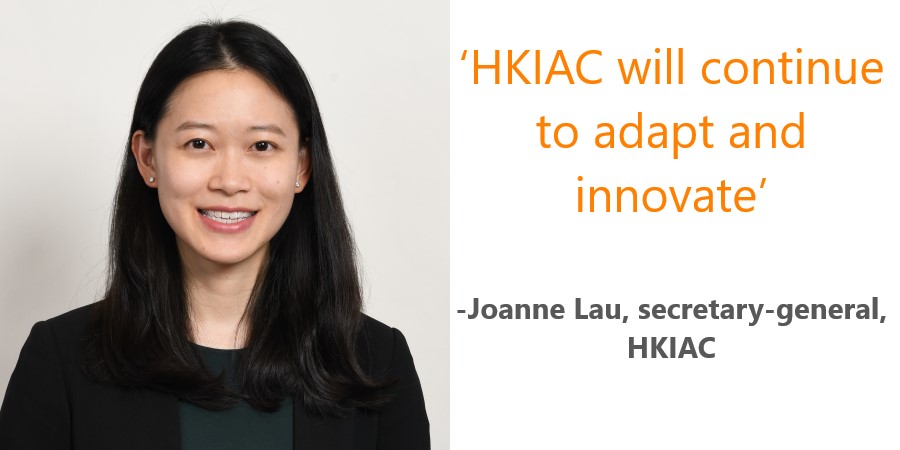
Joanne Lau recently took on the role of secretary-general of the Hong Kong International Arbitration Centre (HKIAC). She shares her plans to showcase the unique advantages that Hong Kong boasts as a top-notch arbitration hub, and how innovation will drive the HKIAC forward.
ALB: How are you planning to bolster Hong Kong’s reputation as a credible international arbitration hub?
JOANNE LAU: With friendly competition between arbitration centres (which I see as a positive thing) and in tricky geopolitical environments, users would understandably scrutinise and compare the performance of different dispute resolution bodies. So, one of my key objectives is to ensure that HKIAC’s case administration and arbitral appointment functions continue to be efficient and of top quality. I am very confident as we have a fantastic multilingual case management team at the Secretariat, which is supported by standing committees composed of a diverse group of experienced external practitioners.
Community engagement is another key goal. This requires having frequent conversations with different stakeholders about the benefits of arbitrating in Hong Kong and creating a vibrant and welcoming environment that encourages exchange of ideas.
Finally, HKIAC will continue to adapt and innovate. Although the 2018 HKIAC Administered Arbitration Rules have been working well, we have proposed certain amendments to respond to arbitration developments and users’ needs, particularly measures aimed at enhancing HKIAC’s role in ensuring the efficiency and integrity of the arbitral process. Public consultation for the proposed amendments is now underway.
ALB: What are some of the challenges facing Hong Kong today as an arbitration centre?
LAU: Substance and perception are both important in maintaining Hong Kong’s status as a leading arbitration centre, and one challenge is to ensure that the public, whether local, regional or international, takes a positive view.
Hong Kong already benefits from sophisticated arbitration legislation and unique arrangements with mainland China, including in obtaining interim measures in support of arbitration. There are many recent court judgments demonstrating the robustness and experience of the Hong Kong courts in handling arbitration-related matters. Hong Kong also has a deep bench of local and foreign arbitration practitioners. So, Hong Kong has the infrastructure and talent pool in place to expertly handle both China-related and non-China related arbitrations. Public perception is just as important, though, as our users from around the world need to understand and recognise these qualities, too. HKIAC plays a crucial role in clearly communicating the advantages of arbitrating in the jurisdiction and promoting its services. I think there is scope to demystify the arbitration process further.
More broadly, although not specific to Hong Kong, parties to arbitration are increasingly focused on the cost and time involved in resolving disputes. The HKIAC rules revision includes proposed amendments which are aimed at promoting efficiency such as introducing time limits on closure of proceedings.
ALB: How do you plan to foster collaboration between the HKIAC and legal professionals, institutions, and stakeholders?
LAU: First, it is key to stay visible and proactive in reaching out to different people and institutions, both locally and in other jurisdictions. To that end, I have a number of upcoming overseas visits and local engagement events in the diary already. The HKIAC has signed a number of MoUs with other institutions to foster collaboration, and I hope to continue to pursue such opportunities as well. Two, it is important to listen and be open-minded. I am eager to hear feedback and suggestions from different parts of the arbitration community. Three, capacity building is important in promoting a healthy arbitration ecosystem. Being a Hong Kong native, I am personally keen to see more local talent joining the profession and specialising in international arbitration, and to support younger practitioners. The HKIAC’s tribunal secretary programme is one such initiative and is now in its tenth year, having successfully trained over 200 tribunal secretaries from across the world.
ALB: How do you plan to integrate and leverage technological advancements within the HKIAC?
LAU: We have state-of-the-art hearing facilities at the HKIAC. Although we have seen the return of popularity of in-person hearings, the availability of virtual hearing facilities means that remote or hybrid hearings can now be easily arranged as and when required by parties and tribunals.
I want to encourage more par-ties to use Case Connect, which is an online case management system that allows documents to be uploaded to a repository and enables communications between parties and tribunals to take place via its platform. It is a very effective tool for enhancing efficiency.
Finally, artificial intelligence is an exciting and fast-developing area, so we will closely follow its developments and keep that under review, too.


